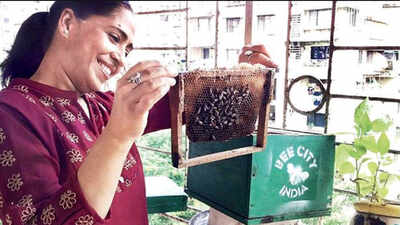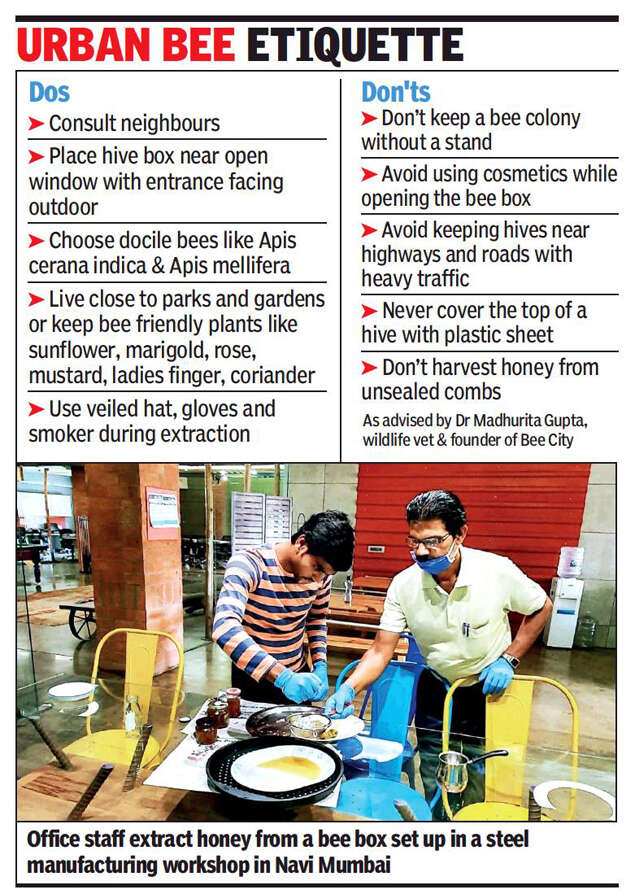Top Searches
- News
- City News
- mumbai News
- Lo & beehold! Honey harvesting at home adds new buzz to Covid-confined Mumbaikars’ lives
Lo & beehold! Honey harvesting at home adds new buzz to Covid-confined Mumbaikars’ lives

Dipa Abhani, a tuition teacher, with bee-boxes at her 12th floor Kharghar home
Tucked away in a noisy corner of south Mumbai is an unlikely sanctuary where the constant hum of everyday traffic is drowned out by the buzzing of bees. Here, on the fifth floor balcony of a dry fruit trader’s apartment in Byculla, a colony is taking shape that could transform the way one lives in cities.

A beekeeper since April, Murtaza Gabajiwala is now part of a growing tribe of at least 50 urban dwellers across Maharashtra raising bees and harvesting honey in their balconies, rooftops and back gardens. Some are doing it to green the city, some to produce their own food and others, out of concern about the plight of pollinators increasingly on the decline.
When the virus confined people to their homes, while some turned to gardening or bird-watching to reconnect with nature, beekeeping in man-made hives—introduced a few years ago to help generate livelihood among rural and tribal communities—intensified at urban locations.
The promise of “one kilo pure homemade nectar in a month” that could boost his family’s immunity amid Covid and help the environment was reason enough to tempt Gabajiwala. “I had lost faith in the honey available in the market after reading an article about major brands adulterating honey with sugar syrup. I’ve been focused on eating right during the pandemic, so when I heard that you could domesticate honey bees, I wanted to try it. It’s amazing to see honey being cultivated right before my eyes,” says Gabajiwala, delighting in the multiflora honey his bees have produced every month, using nectar collected from different trees and flowers at the Byculla zoo, which is half a kilometre from his SoBo home.
With the Central Bee Research and Training Institute (CBRTI), Pune, encouraging beekeeping under the government’s ‘Honey Mission’, apiarist courses have shot up over the last two years. “Earlier, we had mostly farmers sign up for our certificate courses in beekeeping. After we went online because of Covid, we’ve seen lawyers, engineers and professors from Pune, Mumbai and Goa enrol,” informs Sunil Pokare, assistant director, CBRTI.
Helping transform the rural art of beekeeping for the city dweller are independent trainers like wildlife veterinarian Dr Madhurita Gupta, who started ‘Bee City’ in December 2019, a project to improve pollinator habitat in urban areas. “Initially people were scared when we started conducting workshops in Kharghar. Once they realised that honey bees are safe to keep at home and grew conscious of the need to save the dwindling bee population, people from Navi Mumbai, Thane, Karjat, Panvel, Pune and Kolhapur started approaching for help with beekeeping in their houses, farms and factories.”
The low-maintenance activity that requires little space, few tools, some honey bees, and a hive roughly the size of a desk drawer is drawing a new crowd to an old trade. “One can procure an entire bee colony with the wooden box from farmers in Sindhudurg. The top box is where bees store the honey. The bottom holds the queen bee, worker bees, eggs, larvae, and young ones,” says Gupta, adding that anyone can practice apiculture at home. “It’s not essential to have flowering plants at home either because honey bees can travel up to 5km in search of nectar and pollen,” explains Gupta who has been teaching hobby apiarists to handle bees in a way they do not find threatening.
But how wise is it to invite bees into residential limits which can be frightening for the layman or neighbours next door? “The beehives you see hanging from trees are the giant bee types—Apis Dorsata or Apis Florea—that are dangerous. The species that can be domesticated in urban landscape are Apis Cerana Indica and Apis Mellifera because they don’t abscond, their swarming is controllable and won’t sting unless provoked,” explains Gupta, adding that most adults can tolerate more than 1,000 stings. “It’s mostly stingless bees that produce honey worth harvesting. However, one must use caution when extracting honey with protective gear such as a smoker, veiled hat and gloves,” advises Gupta, adding that bee boxes should be kept in an open balcony or window with its entry holes facing outdoors.
Like honeybees, the beekeepers, too, are a small and mighty group doing their bit to maintain nature’s balance. “Our ecology has been disrupted by human intervention and therefore the correction has to be human-induced, too,” reasons Ritu Deshmukh, a conservation architect for whom setting up a bee box in her Kharghar apartment was an extension of her sustainable lifestyle and “a lesson for my children about human and nature coexistence.”
The sweet summery smell pulsing through a steel manufacturing workshop and the newfound bee love among his staff thrills Vibhu Kapoor, who plonked three bee boxes at his office in Navi Mumbai last year. He attributes it to a desire to counterbalance their tech-laden lives. “Many are now hands-on with honey extraction, we asked them to create something with the beeswax as a social exercise. Interestingly, no one made candles but balm for chapped feet or craft paper,” says Kapoor whose initial aim to improve the tree yield around his workplace bore different fruits. “The bees transformed us. Fostered compassionate behaviour and helped cultivate my team’s hive mind.”

A beekeeper since April, Murtaza Gabajiwala is now part of a growing tribe of at least 50 urban dwellers across Maharashtra raising bees and harvesting honey in their balconies, rooftops and back gardens. Some are doing it to green the city, some to produce their own food and others, out of concern about the plight of pollinators increasingly on the decline.
When the virus confined people to their homes, while some turned to gardening or bird-watching to reconnect with nature, beekeeping in man-made hives—introduced a few years ago to help generate livelihood among rural and tribal communities—intensified at urban locations.
The promise of “one kilo pure homemade nectar in a month” that could boost his family’s immunity amid Covid and help the environment was reason enough to tempt Gabajiwala. “I had lost faith in the honey available in the market after reading an article about major brands adulterating honey with sugar syrup. I’ve been focused on eating right during the pandemic, so when I heard that you could domesticate honey bees, I wanted to try it. It’s amazing to see honey being cultivated right before my eyes,” says Gabajiwala, delighting in the multiflora honey his bees have produced every month, using nectar collected from different trees and flowers at the Byculla zoo, which is half a kilometre from his SoBo home.
With the Central Bee Research and Training Institute (CBRTI), Pune, encouraging beekeeping under the government’s ‘Honey Mission’, apiarist courses have shot up over the last two years. “Earlier, we had mostly farmers sign up for our certificate courses in beekeeping. After we went online because of Covid, we’ve seen lawyers, engineers and professors from Pune, Mumbai and Goa enrol,” informs Sunil Pokare, assistant director, CBRTI.
Helping transform the rural art of beekeeping for the city dweller are independent trainers like wildlife veterinarian Dr Madhurita Gupta, who started ‘Bee City’ in December 2019, a project to improve pollinator habitat in urban areas. “Initially people were scared when we started conducting workshops in Kharghar. Once they realised that honey bees are safe to keep at home and grew conscious of the need to save the dwindling bee population, people from Navi Mumbai, Thane, Karjat, Panvel, Pune and Kolhapur started approaching for help with beekeeping in their houses, farms and factories.”
The low-maintenance activity that requires little space, few tools, some honey bees, and a hive roughly the size of a desk drawer is drawing a new crowd to an old trade. “One can procure an entire bee colony with the wooden box from farmers in Sindhudurg. The top box is where bees store the honey. The bottom holds the queen bee, worker bees, eggs, larvae, and young ones,” says Gupta, adding that anyone can practice apiculture at home. “It’s not essential to have flowering plants at home either because honey bees can travel up to 5km in search of nectar and pollen,” explains Gupta who has been teaching hobby apiarists to handle bees in a way they do not find threatening.
But how wise is it to invite bees into residential limits which can be frightening for the layman or neighbours next door? “The beehives you see hanging from trees are the giant bee types—Apis Dorsata or Apis Florea—that are dangerous. The species that can be domesticated in urban landscape are Apis Cerana Indica and Apis Mellifera because they don’t abscond, their swarming is controllable and won’t sting unless provoked,” explains Gupta, adding that most adults can tolerate more than 1,000 stings. “It’s mostly stingless bees that produce honey worth harvesting. However, one must use caution when extracting honey with protective gear such as a smoker, veiled hat and gloves,” advises Gupta, adding that bee boxes should be kept in an open balcony or window with its entry holes facing outdoors.
Like honeybees, the beekeepers, too, are a small and mighty group doing their bit to maintain nature’s balance. “Our ecology has been disrupted by human intervention and therefore the correction has to be human-induced, too,” reasons Ritu Deshmukh, a conservation architect for whom setting up a bee box in her Kharghar apartment was an extension of her sustainable lifestyle and “a lesson for my children about human and nature coexistence.”
The sweet summery smell pulsing through a steel manufacturing workshop and the newfound bee love among his staff thrills Vibhu Kapoor, who plonked three bee boxes at his office in Navi Mumbai last year. He attributes it to a desire to counterbalance their tech-laden lives. “Many are now hands-on with honey extraction, we asked them to create something with the beeswax as a social exercise. Interestingly, no one made candles but balm for chapped feet or craft paper,” says Kapoor whose initial aim to improve the tree yield around his workplace bore different fruits. “The bees transformed us. Fostered compassionate behaviour and helped cultivate my team’s hive mind.”
FacebookTwitterLinkedinEMail
Start a Conversation
end of article

